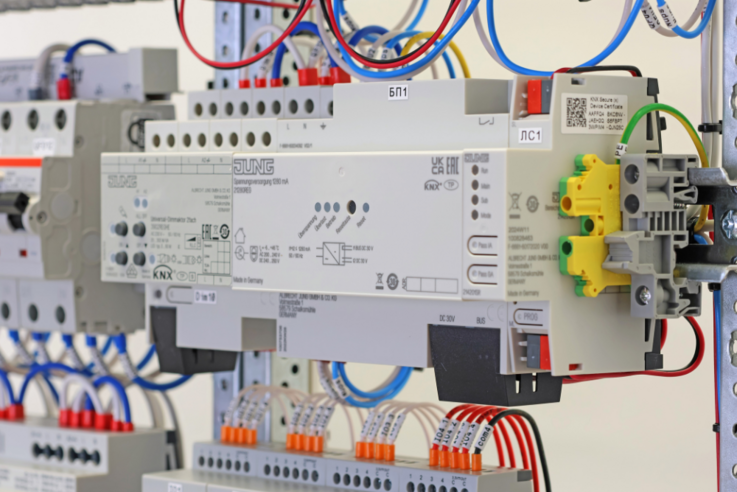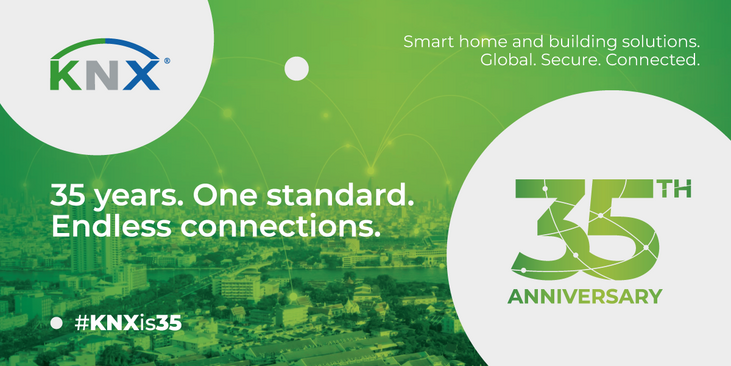31. Jul 2025
KNX vs. Cloud-Based Smart Devices: Which System Better Protects Your Privacy?

With many systems relying on cloud connectivity, the trade-off between convenience and security has become a pressing issue for homeowners. How much personal information is collected? Who owns it? And what happens if that data falls into the wrong hands?
At KNX, privacy isn’t an afterthought — it’s a core design principle of our standard. As a decentralized and locally controlled automation system, KNX ensures that your home’s data stays where it belongs: with you. If you’re comparing smart home solutions and want full transparency and control over your data, this article will show you how KNX stacks up against cloud-based systems—and why more privacy-conscious homeowners are choosing a KNX home automation system as their trusted smart home hub.
Is your smart home safe in the cloud?
Cloud-based smart home systems, like Google Home, Amazon Alexa, Apple HomeKit or Ring, have become a popular addition to many homes. They're user-friendly, offer impressive smart features out of the box and make remote access a breeze. But these benefits come with a price as your data is constantly being sent, stored, and processed through remote servers.

Key privacy concerns with cloud-based smart systems and devices:
Always connected: Devices often transmit data even when you're not using them.
External storage: Voice recordings, user habits, and device usage are stored off-site.
Third-party access: Data can be analyzed or used by manufacturers or advertisers.
Service dependency: Your system relies on their servers—if they go down, so does your control.
For users who value seamless setup, cloud systems may be appealing. But if privacy, data sovereignty and system longevity matter, KNX offers a more secure alternative.
KNX: A local smart home system with built-in privacy
KNX offers a fundamentally different approach. As a decentralized, open standard, it doesn’t rely on continuous cloud connectivity. Instead, all automation happens locally in your home on a secure and encrypted network.

With KNX:
Your data stays in your home, unless you choose to share it.
You’re not forced into any single app brand, or subscription, ensuring your home is scalable and future-proof.
Your smart home functions even without the internet. With our signature green cable, your data will be hardwired and stored in your property. Otherwise, you can also opt for our KNX RF devices (which rely on radio frequencies to function).
Whether you're dimming the lights, adjusting the thermostat or viewing energy stats, the system responds via local control units or KNX-compatible devices, not remote servers.
Cybersecurity: Local data storage means a safer home
Freedom and control thanks to the KNX Standard
Cloud-connected systems can be targeted by cybercriminals, and vulnerabilities are often discovered after devices are already in millions of homes.
In contrast, KNX Secure (based on AES-128 encryption) provides robust protection:
Encrypted communication between devices
Tamper-proof authentication
No open internet ports unless you choose to expose them
Many cloud-based systems lock you into a single brand or app. If that company shuts down a product line, your entire setup may become obsolete. KNX, by contrast, is:
Vendor-agnostic: Compatible with thousands of products from over 500 manufacturers.
Longevity-focused: There are homes with 35-year-old KNX systems (in use since 1990), that still function perfectly and are equipped with the latest security protocols.
Evolving with you: Easily expandable and adaptable as your needs grow.
Who controls your data? You or your cloud provider?

This is the real crux of the matter. With cloud systems, your data often becomes part of the provider’s ecosystem; used for analytics, service improvements, or advertising. You might not even realize how much is being collected.
With KNX, you retain full ownership and control of your data and you won’t be forced to share data unless you intentionally integrate with cloud-based services.
Our installers follow a rigorous course to set up a fully secured system and will configure it according to your privacy needs.
No automatic uploads, no vague permissions.
Why privacy-conscious homeowners choose KNX
You should consider KNX if:
You want local control of your devices without internet dependence.
You're building or renovating a smart home with long-term value.
Privacy and data protection are non-negotiables.
You want future-proof flexibility without sacrificing security.
Privacy as a part of the convenience in home automation
Cloud-based systems may offer plug-and-play simplicity, but often at the cost of privacy, data ownership and long-term flexibility. KNX offers a decentralized, locally managed infrastructure, giving homeowners full control over their smart home, without sending sensitive data to the cloud. Plus, its open standard ensures freedom of choice and future-proof scalability, without locking you into one brand or ecosystem.
If you’re looking for a smart home solution that’s truly secure, flexible, and built for the long haul, it’s time to consider KNX.
Highlights
-
 Press
PressKNX Launches KNX Standard Version 3.0.4
KNX Association is proud to announce the release of Version 3.0.4 of the KNX Standard to its manufacturer members. The KNX ... -
 News
NewsThe KNX Journal 2025 is now available
The latest edition of our annual smart home and building solutions magazine has arrived. The KNX Journal 2025 offers ... -
 KNXtoday
KNXtoday#KNXis35: KNX history and evolution
KNX is 35. This worldwide building control standard, initiated by a handful of visionary European manufacturers, now has ...
